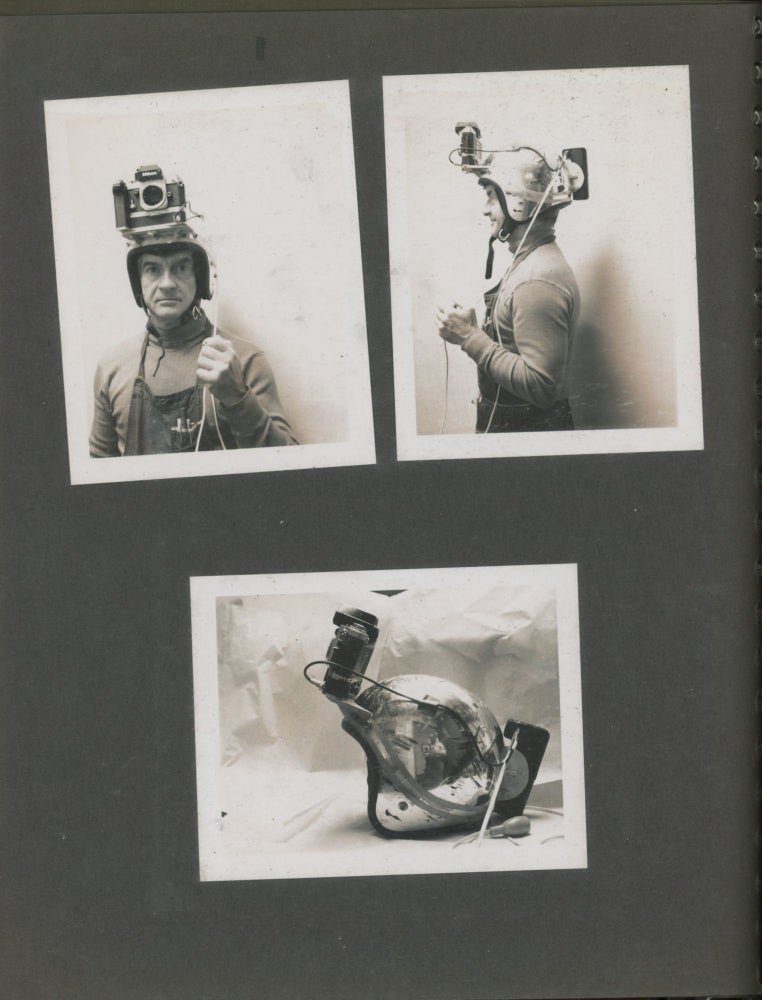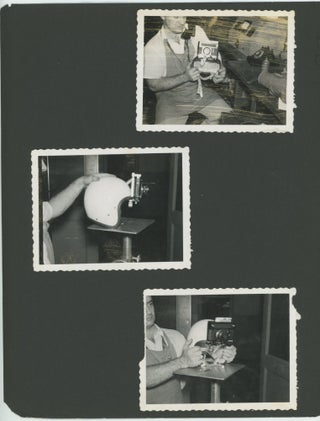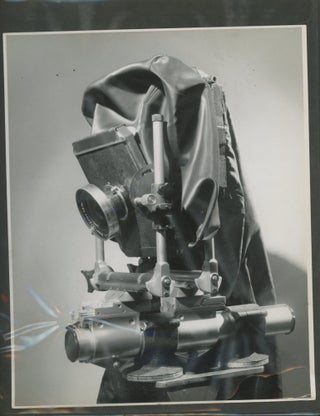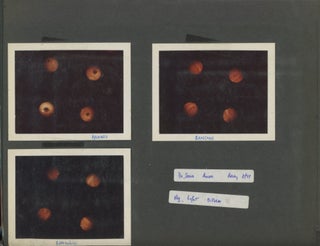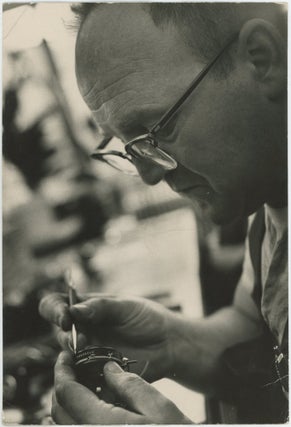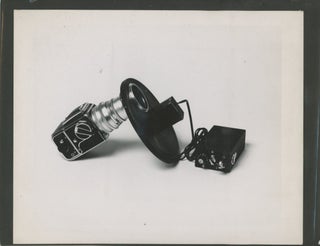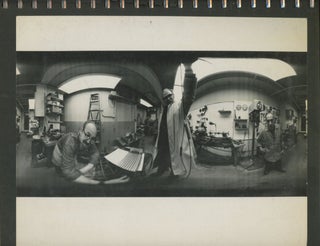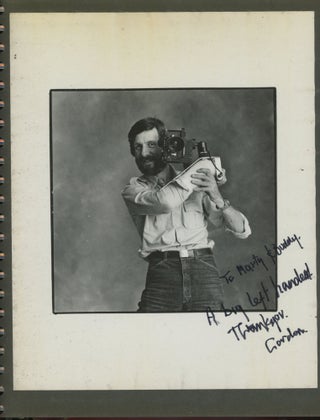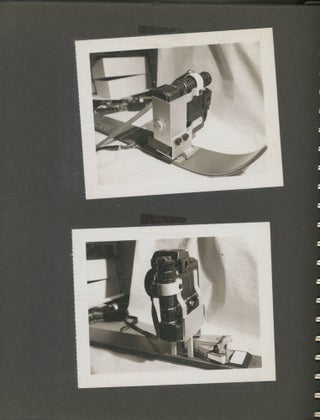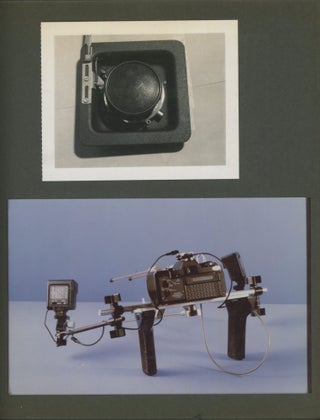PROFESSIONAL CAMERA REPAIR SERVICE, NYC – PHOTO EQUIPMENT PROTOTYPES AND MORE – 1960s – 1980s PHOTO ALBUMS
Item #184
There are over 170 photographs in this amazing two album collection documenting photographic experiments, camera parts and repairs, new inventions as well as a few shots of the repairmen at work from the famed and beloved Professional Camera Repair Service shop in New York City. Started and run by repairman and inventor Martin Forscher, and joined by additional talented “mechanical wizard” Buddy Graves and others, the repair shop serviced camera bodies of all types for more than 40 years (Marty owned it from its birth in 1946 to when he sold it in 1987), as well as birthing new camera related alterations and creations that changed the ways and locations cameras could be used forever. Marty’s most famous invention was the Pro-Back, patented in 1982, which was “a Polaroid attachment for a 35-millimeter camera that gave photographers an immediate proof print, letting them test a shot without having to wait for the film to be developed.” Famed clientele of the shop included fashion photographer Richard Avedon, street portrait and landscape photographer Joel Meyerowitz, celebrity and fine art photographer Annie Leibovitz, and photojournalist and portrait photographer Mary Ellen Mark. Included in these albums are photos of equipment by well-known photographers, including Mildred Grossman (Civil Rights Activist), Robert Galbraith, Ken Korsh and Peter Moore. The albums in this collection are spiral bound and measure 10” x 11.5”, and each has a label on the cover for PCRS. The albums appear to be complete, with a few loose photos and pages. All pages are black paper and plastic-covered with photos (Polaroids and 8x10s) primarily attached with tape, some loose behind the plastic. The first album is full with all pages used, the second album has a few blank in the back. Photo dimensions vary up to full 8” x 10” sheets, mostly black and white studio shots of camera bodies and equipment, with 6 color photos including 2 polaroids and 3 photos of the inside of a body cavity using one of Marty’s inventions – a camera attachment allowing doctors to photograph and see instant photos from inside the peritoneal cavity (there is a full paged magazine article clipping detailing the story with the doctor and Marty accompanying the photos in the album). Other inventions pictured include helmet mounts, ski mounts, fish eye super wide angle lens alterations, a studio shoot of a photographer sporting a mount specifically made for use with an arm in a hard cast (and a signed photo from the injured photographer with thank you note), and many more. Another magazine article clipping details one of Buddy’s inventions, the “Buddywide” which enables slight shifts in the lens mount without tilting the camera for an architect seeking to capture his whole subject without distorting important perspective lines. Also included is a hand drawn mockup diagram of new mounting hardware. This collection is truly an amazing piece of photography history and an up close and personal look behind the scenes in the beloved camera butcher’s lair. A few pages and photos are loose, the emulsion on some older photos appears to be sticking to the plastic covering of the page, and the front cover of album one is detached. Otherwise, the photos and albums are in good condition.
Marty Forscher was such an important and admired figure in the photography world, and in the world that shifted due to what photography could expose to the public (from war zones to critical documentation of brutality in the Civil Rights movement and more), that the New York Times published a loving obituary following his death in 2009.
From the New York Times obituary (October 10, 2009):
“Marty Forscher, whose intimate knowledge of the anatomy and physiology of the camera and of the myriad ways in which photographers can unsettle them made him for decades the most sought-after camera repairman in the country, died on Sept. 30 in Pittsfield, Mass. He was 87 and lived in Pittsfield. […] For more than 40 years, Mr. Forscher ran Professional Camera Repair Service in Midtown Manhattan. Founded in 1946, the shop was a Mecca for generations of camera owners […]
Among the shop’s well-known clients were the photographers Richard Avedon, Joel Meyerowitz, Annie Leibovitz and Mary Ellen Mark. […] Though renowned as a repairman, Mr. Forscher was perhaps best described as an armorer. For if news photographers were foot soldiers in the fight for social justice, as he long maintained, then he was intent on equipping them soundly. As a result, many of the seminal events of mid-20th-century history World War II, the American civil rights movement, the Vietnam War were recorded in part by cameras he had repaired, donated or adapted.
“The attitude was that these photojournalists are the ones that have to stick their heads up out of that foxhole to get the pictures, so their cameras damn well better work,” Noah Schwartz, a former machinist’s assistant in Mr. Forscher’s shop, said in a telephone interview on Tuesday. “So every camera we fixed was with that attitude.” To the supplicants who thronged his counter, and the others who placed frantic calls from obscure corners of the world at obscure hours of the night, Mr. Forscher was equal parts detective, diagnostician, conjurer and psychotherapist. Many photographers referred to him as the Savior. The more concision-minded simply called him God. When the shop went out of business in 2001 (Mr. Forscher had sold it to colleagues when he retired in 1987), the photographic community heaved a collective shudder of panic. […] His best-known invention, patented in 1982, was the Pro-Back, a Polaroid attachment for a 35-millimeter camera that gave photographers an immediate proof print, letting them test a shot without having to wait for the film to be developed. Mr. Forscher also created an early compact motor drive for still cameras. […] In the early 1960s, Mr. Forscher began begging discarded cameras from magazines, fixing them and sending them South. There, members of the Student Nonviolent Coordinating Committee used them to document the civil rights movement in images published in newspapers and magazines around the world. Some were of signal events, like Bloody Sunday March 7, 1965 when state troopers beat black marchers in Selma, Ala. Others captured small daily victories, like a black child learning to read at a Mississippi Freedom School. When the cameras were dashed to the ground or drenched by police fire hoses, Mr. Forscher repaired them and sent them back again. […] Since 1990, the Marty Forscher Fellowship has been awarded to students and young professionals specializing in humanistic documentary photography. The fellowship is given annually by Photo District News, a trade publication, and Parsons the New School for Design.” - https://www.nytimes.com/2009/10/11/nyregion/11forscher.html.
Price: $2,750.00

